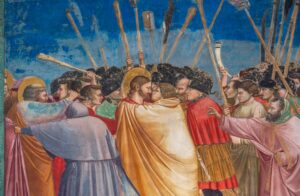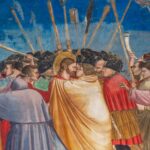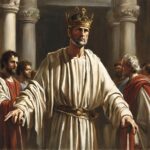John Chapter 18:1-40 King James Bible KJV

The Passion of Christ, The Arrest of Jesus, Peter’s Denial, Jesus Before Pilate
John Chapter 18:1-40 King James Bible KJV. John Chapter 18 records the beginning of the Passion of Christ, detailing his arrest, trial, and Peter’s denial. This chapter portrays Jesus as resolute, willingly submitting to God’s plan, and maintains his authority even when betrayed. The narrative emphasizes Jesus’ identity as the Messiah, his commitment to truth, and the unfolding of prophecy through his suffering.
John 18 highlights Jesus’ courage, authority, and obedience to God’s will in the face of betrayal, denial, and unjust accusations. The chapter contrasts human weakness and misunderstanding with Jesus’ steadfast commitment to God’s purpose, demonstrating his role as the sacrificial Lamb who willingly takes on the world’s sin. This chapter sets the stage for the events of the crucifixion and ultimately underscores Jesus’ identity as the King of a heavenly, eternal kingdom.
Key Themes
- Jesus’ Authority and Willing Submission: From the moment of his arrest, Jesus is portrayed as fully in control. His “I am” statement and the soldiers’ reaction reveal his divine authority. Yet, he chooses to submit to God’s will, fulfilling prophecy and accepting the path to the cross.
- Contrast Between Jesus and His Followers: Peter’s denial stands as a poignant contrast to Jesus’ faithfulness. While Peter’s human fear leads him to deny Jesus, Jesus remains steadfast and committed to God’s will, even in the face of suffering and death.
- The Nature of Jesus’ Kingdom: Jesus clarifies to Pilate that his kingdom is “not of this world.” His mission is spiritual, focused on truth, salvation, and eternal life rather than earthly power. This distinction separates Jesus’ role as Messiah from political or revolutionary expectations, presenting a kingdom built on divine truth and love.
- Rejection of Truth and the Role of Pilate: Pilate’s question, “What is truth?” captures the world’s skepticism and misunderstanding of Jesus. Pilate’s inability to recognize Jesus as the embodiment of truth leads to a tragic miscarriage of justice, reflecting humanity’s broader rejection of Jesus.
John Chapter 18:1-40 King James Bible KJV
—————-

The Arrest of Jesus – verses 1-11
After finishing his prayer in the Garden of Gethsemane, Jesus goes to a familiar spot with his disciples, knowing Judas will betray him there. Judas arrives with soldiers and temple officials carrying weapons and torches. Jesus steps forward and identifies himself, saying, “I am he.” This statement, “I am,” echoes God’s divine name in the Old Testament, subtly affirming his identity as the Son of God.
The soldiers fall back at his words, displaying his authority even in this moment of apparent vulnerability. Peter tries to defend Jesus, drawing a sword and cutting off the ear of Malchus, a servant of the high priest. Jesus, however, tells Peter to put away his sword, saying he must “drink the cup” the Father has given him. This “cup” refers to his coming suffering and death, which he accepts as God’s will.

Peter’s Denial – verses 15-18, 25-27
While Jesus is being questioned, Peter waits in the courtyard, warming himself by a fire. Three times he is questioned about his association with Jesus, and three times he denies knowing him. His final denial is immediately followed by a rooster crowing, fulfilling Jesus’ earlier prediction. Peter’s denial contrasts sharply with Jesus’ courage and faithfulness. This moment emphasizes Peter’s human weakness and foreshadows his later repentance and restoration.


Jesus Before Pilate – verses 28-40
Jesus is brought before Pontius Pilate, the Roman governor, early in the morning. The religious leaders avoid entering Pilate’s residence to remain ceremonially clean for the Passover, so Pilate comes outside to meet them.
Pilate questions them about the charges against Jesus, but they avoid specifics, accusing Jesus in general terms. Pilate suggests they handle the matter themselves, but they insist they lack the authority to execute him, foreshadowing Jesus’ crucifixion. Pilate returns to question Jesus directly, asking if he is the “King of the Jews.” Jesus clarifies that his kingdom is not of this world, indicating a spiritual rather than political kingdom. This distinction shows that Jesus’ mission is beyond earthly power and authority.
Pilate then famously asks, “What is truth?” after Jesus says, “Everyone on the side of truth listens to me.” Pilate’s question reveals his cynicism or confusion about truth, contrasting with Jesus, who embodies and proclaims truth. Although Pilate finds no basis for a charge against Jesus, he offers to release him as part of a Passover tradition. The crowd, however, chooses to release Barabbas, a known criminal, over Jesus, showcasing their rejection of him as the Messiah.
John Chapter 18:1-40 King James Bible KJV
1 When Jesus had spoken these words, he went forth with his disciples over the brook Cedron, where was a garden, into the which he
entered, and his disciples.
2 And Judas also, which betrayed him, knew the place: for Jesus ofttimes resorted thither with his disciples.
3 Judas then, having received a band of men and officers from the chief priests and Pharisees, cometh thither with lanterns and torches and weapons.
4 Jesus therefore, knowing all things that should come upon him, went forth, and said unto them, Whom seek ye?
5 They answered him, Jesus of Nazareth. Jesus saith unto them, I am he. And Judas also, which betrayed him, stood with them.
6 As soon then as he had said unto them, I am he, they went backward, and fell to the ground.
7 Then asked he them again, Whom seek ye? And they said, Jesus of Nazareth.
8 Jesus answered, I have told you that I am he: if therefore ye seek me, let these go their way:
9 That the saying might be fulfilled, which he spake, Of them which thou gavest me have I lost none.
10 Then Simon Peter having a sword drew it, and smote the high priest’s servant, and cut off his right ear. The servant’s name was Malchus.
11 Then said Jesus unto Peter, Put up thy sword into the sheath: the cup which my Father hath given me, shall I not drink it?

12 Then the band and the captain and officers of the Jews took Jesus, and bound him,
13 And led him away to Annas first; for he was father in law to Caiaphas, which was the high priest that same year.
14 Now Caiaphas was he, which gave counsel to the Jews, that it was expedient that one man should die for the people.
15 And Simon Peter followed Jesus, and so didanother disciple: that disciple was known unto the high priest, and went in with Jesus into the palace of the high priest.
16 But Peter stood at the door without. Then went out that other disciple, which was known unto the high priest, and spake unto her that kept the door, and brought in Peter.
17 Then saith the damsel that kept the door unto Peter, Art not thou also one of this man’s disciples? He saith, I am not.
18 And the servants and officers stood there, who had made a fire of coals; for it was cold: and they warmed themselves: and Peter stood with them, and warmed himself.
19 The high priest then asked Jesus of his disciples, and of his doctrine.
20 Jesus answered him, I spake openly to the world; I ever taught in the synagogue, and in the temple, whither the Jews always resort; and in secret have I said nothing.
21 Why askest thou me? ask them which heard me, what I have said unto them: behold, they know what I said.
22 And when he had thus spoken, one of the officers which stood by struck Jesus with the palm of his hand, saying, Answerest thou the high priest so?
23 Jesus answered him, If I have spoken evil, bear witness of the evil: but if well, why smitest thou me?
24 Now Annas had sent him bound unto Caiaphas the high priest.
25 And Simon Peter stood and warmed himself. They said therefore unto him, Art not thou also oneof his disciples? He denied it, and said, I am not.
26 One of the servants of the high priest, being hiskinsman whose ear Peter cut off, saith, Did not I see thee in the garden with him?
27 Peter then denied again: and immediately the cock crew.

28 Then led they Jesus from Caiaphas unto the hall of judgment: and it was early; and they themselves went not into the judgment hall, lest they should be defiled; but that they might eat the passover.
29 Pilate then went out unto them, and said, What accusation bring ye against this man?
30 They answered and said unto him, If he were not a malefactor, we would not have delivered him up unto thee.
31 Then said Pilate unto them, Take ye him, and judge him according to your law. The Jews therefore said unto him, It is not lawful for us to put any man to death:
32 That the saying of Jesus might be fulfilled, which he spake, signifying what death he should die.
33 Then Pilate entered into the judgment hall again, and called Jesus, and said unto him, Art thou the King of the Jews?
34 Jesus answered him, Sayest thou this thing of thyself, or did others tell it thee of me?
35 Pilate answered, Am I a Jew? Thine own nation and the chief priests have delivered thee unto me: what hast thou done?
36 Jesus answered, My kingdom is not of this world: if my kingdom were of this world, then would my servants fight, that I should not be delivered to the Jews: but now is my kingdom not from hence.
37 Pilate therefore said unto him, Art thou a king then? Jesus answered, Thou sayest that I am a king. To this end was I born, andfor this cause came I into the world, that I should bear witness unto the truth. Every one that is of the truth heareth my
voice.
38 Pilate saith unto him, What is truth? And when he had said this, he went out again unto the Jews, and saith unto them, I find in him no fault at all.
39 But ye have a custom, that I should release unto you one at the passover: will ye therefore that I release unto you the King of the Jews?
40 Then cried they all again, saying, Not this man, but Barabbas. Now Barabbas was a robber
You must be logged in to post a comment.